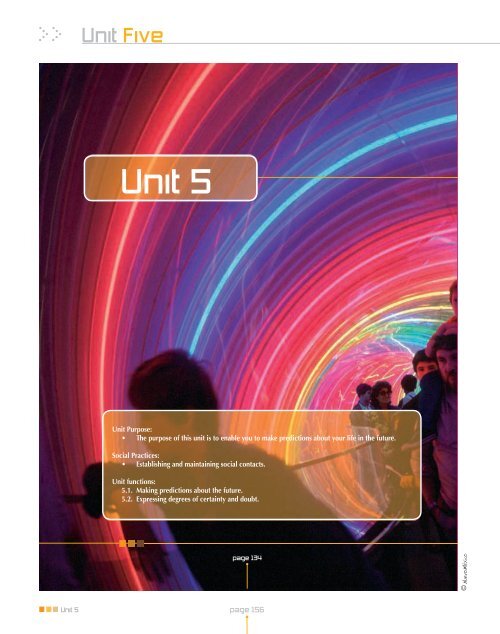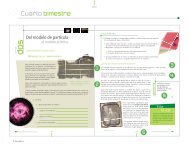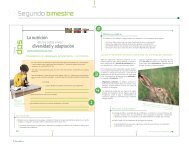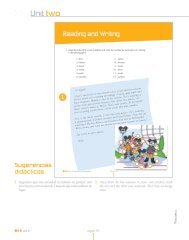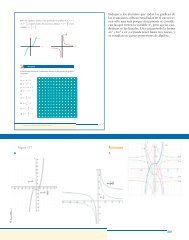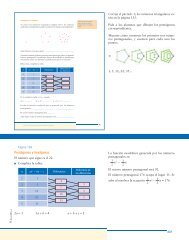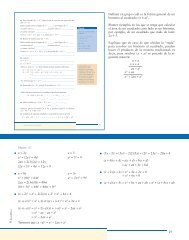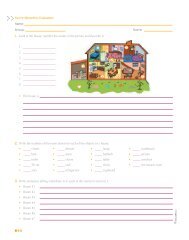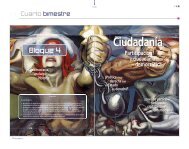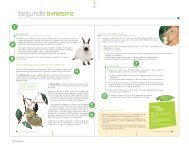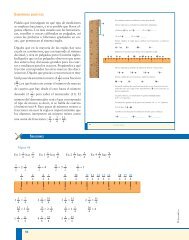Unit 5
Unit 5
Unit 5
Create successful ePaper yourself
Turn your PDF publications into a flip-book with our unique Google optimized e-Paper software.
<strong>Unit</strong> Five<br />
<br />
<br />
<br />
<br />
<strong>Unit</strong> 5<br />
<br />
<br />
<br />
<br />
<br />
<br />
<strong>Unit</strong> Purpose:<br />
• The purpose of this unit is to enable you to make predictions about your life in the future.<br />
<br />
Social Practices:<br />
<br />
• Establishing and maintaining social contacts.<br />
<strong>Unit</strong> functions:<br />
5.1. Making predictions about the future.<br />
5.2. Expressing degrees of certainty and doubt.<br />
<br />
<br />
Tapescripts<br />
page page 134 134<br />
<strong>Unit</strong> 5<br />
page 156
Life in the Future<br />
Performance evidence:<br />
• You will be able to recognize and understand quotidian texts in order to use<br />
them purposefully.<br />
• You will be able to use language creatively and appropriately by selecting lexis,<br />
phrases and grammatical resources in order to produce meaningful, relevant and<br />
clear texts when making predictions and when expressing certainty and doubt about<br />
the future.<br />
page 135<br />
page 157 <strong>Unit</strong> 5
<strong>Unit</strong> Five<br />
Lesson<br />
one<br />
Predicting the weather<br />
Social practices: Establishing and maintaining social contacts.<br />
In this lesson you will learn: • How to make predictions about the weather.<br />
1<br />
Write the words from the box under the symbols.<br />
snow rain sunny windy cloudy<br />
______________ rain ______________ sunny ______________ cloudy ______________<br />
snow ______________<br />
windy<br />
2<br />
Look at the map and complete the sentences<br />
with the words from the previous exercise.<br />
Let’s look at the weather report for tomorrow.<br />
The weather will be varied on our island. In<br />
Lancaster, the weather will be nice. It will<br />
be sunny most of the day. In Freetown it<br />
will be ______________, sunny but it will also be<br />
______________. cloudy In Springvalley, tomorrow<br />
it will be ______________, cloudy and finally, in<br />
Goldtown, it will be ______________ windy and<br />
______________. cool There won’t be any rain<br />
tomorrow, so you can leave your umbrellas<br />
at home.<br />
hot<br />
warm<br />
nice<br />
cool<br />
cold<br />
Write three sentences about the weather<br />
on the island. You can choose words<br />
from the box.<br />
<br />
In Freetown, it will be warm.<br />
1. _______________________________<br />
2. _______________________________<br />
3. _______________________________<br />
Discover the rule<br />
We use “will” and “won’t” to express<br />
the future.<br />
Circle the correct form of the verb.<br />
The weather will is / be nice.<br />
It won’t rains / rain in the afternoon.<br />
Sugerencias<br />
didácticas<br />
<strong>Unit</strong> 5, Life in the Future<br />
page 136<br />
1. Es posible que los alumnos recuerden cómo describir el<br />
clima. Entonces, pídales que cubran las palabras en el libro<br />
e intenten decirlas sin verlas; también puede intentar<br />
que las mencionen antes de que los alumnos abran sus<br />
libros para iniciar la actividad.<br />
2. Asegúrese de que los alumnos se den cuenta que will y won’t<br />
van seguidos por el verbo principal en infinitivo sin to.<br />
1. Students should remember words to describe the weather<br />
from previous lessons. So, you can have students cover<br />
the words and try to provide them without looking, or you<br />
can try to elicit words to describe weather before having<br />
students open their books to do the activity.<br />
2. Make sure that students notice that “will” and “won’t” are<br />
followed by the main verb in the base form.<br />
<strong>Unit</strong> 5<br />
page 158
Read the text and answer True or False:<br />
1<br />
All scientists say that pollution is the cause of global warming. True ✓ False<br />
Summers will get hotter. ✓ True False<br />
Winters will get hotter. True ✓ False<br />
Global warming<br />
In the graph, you can see the change in<br />
temperature from 1860 to 2004. It got a lot<br />
warmer after 1900, and again after 1980. What<br />
will happen in the future?<br />
We know that the earth is getting warmer.<br />
This change is called “global warming.” Many<br />
scientists say that global warming is caused by<br />
pollution, but there are also scientists that think<br />
that there are other, natural causes.<br />
All scientists have the same opinion about the<br />
weather: it will change more. It will be colder<br />
in winter, and there will be more snow. In summer, it will be<br />
hotter, and there will be more hurricanes in summer and fall.<br />
Source: Wikipedia<br />
Match the phrases on the left with the ones on the right.<br />
It will<br />
There will<br />
It won’t<br />
There won’t<br />
be more hurricanes.<br />
be more hurricanes.<br />
be hotter in summer.<br />
be warmer in winter.<br />
<br />
See Picture Dictionary 8, 9 and 10 on<br />
page 192 and 193, to find vocabulary<br />
related to the seasons, the weather<br />
and temperatures.<br />
Complete the weather report with appropriate words or phrases.<br />
Here is the weather report for Dawnville for the next 24 hours. ____________________ It will be a beautiful<br />
sunny day. __________ There won’t be clouds in the morning, but in the afternoon ____________________<br />
there will be<br />
more clouds. ____________________ There will be some rain in the afternoon, but __________ there won’t be any<br />
storms or hurricanes. It will be warm: we expect temperatures from 17 degrees in the morning to<br />
about 23 in the afternoon. Enjoy your day tomorrow!<br />
<br />
<br />
Listen to the weather report and check your answers.<br />
Research on the Internet the weather forecast for your area. Write a similar weather report.<br />
2<br />
page 137<br />
Predicting the weather<br />
1. Antes de iniciar con la lectura, platique con la clase sobre<br />
el calentamiento global y pídales que mencionen sus causas<br />
y consecuencias.<br />
2. Los alumnos pueden hacer la actividad 6 en pares o en<br />
grupos pequeños y luego compartir su reporte del clima<br />
con la clase.<br />
1. Before doing the reading, you can have a discussion about<br />
global warming with the whole class and have them tell<br />
you what they know about its causes and what the results<br />
will be.<br />
2. Students can do activity 6 in pairs or small groups and<br />
then share their weather report with the whole class.<br />
page 159 <strong>Unit</strong> 5
<strong>Unit</strong> Five<br />
Lesson<br />
two<br />
Your life will be different!<br />
Social practices: Establishing and maintaining social contacts.<br />
In this lesson you will learn: • How to make predictions about people’s lives.<br />
1<br />
Look at the pictures below. Do you know what fortune cookies are? Read the article and<br />
speculate about the missing information.<br />
Fortune Cookies – Do They Tell You Your Future?<br />
A Fortune Cookie is a delicate cookie that you can get in a ________________ Chinese restaurant,<br />
often as dessert. When you open the cookie, you find a small piece of ________________<br />
paper<br />
inside. This is called “a fortune”. On the paper is a sentence about your future or<br />
about your luck. Fortune cookies are not a Chinese invention; they were invented in<br />
________________ California about 100 years ago. Interesting!<br />
Here are some typical sentences that people find in their<br />
fortune cookies:<br />
Someone will invite you to an important<br />
event.<br />
The time is right to make new friends.<br />
You will travel to many countries.<br />
Happy news is coming to you soon.<br />
Sugerencias<br />
didácticas<br />
2<br />
<br />
<br />
Now listen to the radio program and write the correct information in the text.<br />
Match the phrases to make logical fortunes.<br />
Your life will…<br />
a pleasant experience.<br />
Generosity and perfection… are 34, 18 and 62.<br />
Your lucky numbers…<br />
are your objectives.<br />
You will have…<br />
be happy and peaceful.<br />
Other people…<br />
will see your talents.<br />
<strong>Unit</strong> 5, Life in the Future<br />
page 138<br />
1. Pregunte a los alumnos lo que saben sobre las galletas de<br />
la fortuna y de dónde piensan que provienen.<br />
2. Pregúnteles si les sorprendió el lugar donde se inventaron<br />
las galletas de la fortuna.<br />
1. You can ask students what they know about fortune<br />
cookies and where they think they come from.<br />
2. You can ask students if they were surprised about where<br />
fortune cookies were invented.<br />
<strong>Unit</strong> 5<br />
page 160
Now write a fortune on a piece of paper. Give your paper to your teacher. The teacher will mix<br />
up the fortunes and give you one. Read your fortune and complete the information below.<br />
What does your fortune say? __________________________________________________________<br />
Can your fortune become reality? Why, or why not? ______________________________________<br />
<br />
<br />
Madame Starlight is a fortune teller. Listen to her prediction and circle the correct<br />
answers below.<br />
1<br />
According to Madame Starlight…<br />
you will have a long / short life.<br />
you will / won’t get married.<br />
you will have two / three children.<br />
Work in pairs. Give your partner a prediction.<br />
Complete the text with “will” and “won’t”.<br />
2<br />
Dear ______________ (your classmate’s name),<br />
Let me look into my crystal ball... Interesting, very interesting.<br />
You ______________ finish the third year of middle school.<br />
You ______________ go to high school. Farther in the future,<br />
you ______________ get married and you ______________<br />
have children. You ______________ live in this town. You<br />
_____________ get rich.<br />
Discover the rule<br />
Choose the correct option.<br />
For predictions about the future, we use<br />
will / be going to.<br />
The negative of ‘will’ is __________. won’t<br />
Read the prediction to your classmate.<br />
Work with a different partner. Imagine you<br />
can read your classmate’s palm.<br />
<br />
Your life will be wonderful.<br />
You will get rich.<br />
You won’t live in another<br />
town.<br />
page 139<br />
Your life will be different<br />
1. Cuestiónelos si las galletas de la fortuna siempre predicen<br />
cuestiones positivas sobre el futuro o si en ocasiones predicen<br />
cosas negativas y por qué.<br />
2. Señale que will y be going to tienen el mismo significado,<br />
pero que con diferentes usos. Uno de los usos de will es<br />
para predecir el futuro.<br />
1. You can ask students if they think fortunes always predict<br />
positive things in the future or sometimes negative things<br />
and why.<br />
2. Point out that “will” and “be going to” have the same<br />
meaning, but they have different uses. One of the uses of<br />
“will” is to give predictions about the future.<br />
page 161 <strong>Unit</strong> 5
<strong>Unit</strong> Five<br />
Lesson<br />
three<br />
Future plans<br />
Social practices: Establishing and maintaining social contacts.<br />
In this lesson you will learn: • How to making predictions about your future.<br />
Answer the questions with “Yes, I will,” or, “No, I won’t.”<br />
Will you travel a lot when you are an adult?<br />
_____________________________________.<br />
Will you have five or more children?<br />
_____________________________________.<br />
Will you live in this town all your life?<br />
_____________________________________.<br />
1<br />
Discover the rule<br />
To ask a question about a prediction of the<br />
future, we can use will.<br />
Circle the correct form.<br />
You will / Will you work in an office when<br />
you are an adult?<br />
Write an additional question.<br />
2<br />
Will you _________________________________________?<br />
Work with your class. Write the results<br />
of the three questions, then report the<br />
results below.<br />
_________ classmates think they will<br />
travel a lot when they are adults.<br />
_________ classmates think they will<br />
have eight or more children.<br />
_________ classmates think they will<br />
live in this town all their lives.<br />
<br />
Will you speak English very well?<br />
Sugerencias<br />
didácticas<br />
Ask 10 classmates your question, and write the results below. When you are ready, report the<br />
results to the class.<br />
__________________________________________________<br />
__________________________________________________<br />
__________________________________________________<br />
__________________________________________________<br />
__________________________________________________<br />
__________________________________________________<br />
__________________________________________________<br />
<strong>Unit</strong> 5, Life in the Future<br />
page 140<br />
1. Averigüe cuáles fueron las respuestas más comunes.<br />
2. Asegúrese de que los alumnos entienden que invertimos<br />
el sujeto y will para formar preguntas sobre el futuro.<br />
1. Check with the whole class to find out what the most<br />
common answers were.<br />
2. Make sure students understand that we invert the subject<br />
and “will” to form questions about future prediction.<br />
<strong>Unit</strong> 5<br />
page 162
Listen to the conversation and circle the answer to the questions.<br />
Will the boy go to high school? Yes, he will. No, he won’t.<br />
Will the girl go to high school? Yes, he will. No, he won’t.<br />
she<br />
she<br />
<br />
1<br />
Discover the rule<br />
We can describe possible actions in the future with<br />
when.<br />
Write logical verbs in the spaces.<br />
When I ______ finish secondary school, I will _____ go to high<br />
school.<br />
2<br />
Work in pairs. Practice the dialog. Use your own information. Switch roles.<br />
A: When I finish secondary, I will go to high school. And you?<br />
B: I won’t go to high school.<br />
A: Why not?<br />
B: When I finish high school, I will have to __________________________.<br />
A: That’s too bad.<br />
B: Yeah. But we can still be friends.<br />
Work in pairs again. Talk about<br />
your real plans.<br />
<br />
A: When I finish high school, I won’t go to high school. And you?<br />
B: I will go to high school.<br />
A: Why?<br />
B: Because I want to go to the university later.<br />
A: That’s good.<br />
page 141<br />
Future plans<br />
1. Asegúrese de que los alumnos entienden que en respuestas<br />
cortas para predicciones del futuro repetimos solamente<br />
will o won’t.<br />
2. Señale que en esta estructura ponemos el verbo en presente<br />
simple en la cláusula con when a pesar de que estamos<br />
hablando del futuro. La otra cláusula está en el futuro<br />
con will.<br />
1. Make sure that students understand that in short answers<br />
for future prediction, we repeat only “will” or “won’t”.<br />
2. Point out that in this structure, we put the verb in simple<br />
present in the clause with “when” even though we’re<br />
talking about the future. The other clause is in the future<br />
with “will”.<br />
page 163 <strong>Unit</strong> 5
<strong>Unit</strong> Five<br />
Lesson<br />
four<br />
This town in the future<br />
Social practices: Establishing and maintaining social contacts.<br />
In this lesson you will learn: • How to asking about predictions of the future.<br />
1<br />
Take the test.<br />
Future Expectation Test<br />
What do you think about the future of your town. What will<br />
your country be like in 2050?<br />
Take the test and compare your ideas with your classmates.<br />
What will your town be like in 2050?<br />
a. I think it will be a big city.<br />
b. I think it will still be a small town.<br />
What about the population of your town in 2050?<br />
a. There will be many people.<br />
b. There will be few people.<br />
What will the country be like in 2050?<br />
a. it will be a rich country.<br />
b. it will be the same.<br />
c. it will be a poor country.<br />
Will there be a lot of pollution in 2050?<br />
a. Yes, because there will be many factories.<br />
b. No, because people will protect the environment.<br />
Will we all have a robot in our houses in 2050?<br />
a. Yes, we will.<br />
b. No, we won’t.<br />
Compare your answers with your<br />
classmates. Did they write the<br />
same answers?<br />
<br />
What did you write for number 1?<br />
I wrote b. I think our town won’t change.<br />
And you? I wrote a.<br />
Discover the rule<br />
Underline _______ the correct question<br />
and _______ cross out the incorrect questions.<br />
What will be like the city in 40 years?<br />
What will the city be like in 50 years?<br />
Will what the city be like in 60 years?<br />
2<br />
3<br />
Sugerencias<br />
didácticas<br />
<strong>Unit</strong> 5, Life in the Future<br />
page 142<br />
1. Antes de hacer esta actividad, pregunte a los alumnos sobre<br />
los aspectos que han cambiado en su país durante los<br />
últimos 50 años y cómo creen que vaya a cambiar en los<br />
próximos 50 años.<br />
2. Averigüe cuales fueron las respuestas más comunes.<br />
3. Asegúrese que los alumnos entienden que la estructura<br />
What will ... be like in ...? se usa para pedir una descripción<br />
en futuro.<br />
1. Before doing this activity, you can ask students what has<br />
changed in their country over the past 50 years and how<br />
they think it will change in the next 50 years.<br />
2. You can then check with the whole class to find out what<br />
the most common answers were.<br />
3. Make sure students understand that the structure “What<br />
will … be like in …?” asks for a description of something<br />
in the future.<br />
<strong>Unit</strong> 5<br />
page 164
Write three additional questions and ask your classmates.<br />
<br />
What will ______________________________________________________ in _______?<br />
Will there be ___________________________________________________ in _______?<br />
Will we all _____________________________________________________ in _______?<br />
Work in groups, and decide on the answers<br />
for the trivia questions.<br />
<br />
How many people live in the world today? In English, a billion<br />
is 1 000 000 000.<br />
4.5 billion 6.5 billion 8.5 billion<br />
2. How many people will there be in the world in the<br />
year 2050?<br />
8 billion 9 billion 10 billion<br />
3. What percentage of the world’s population lives in<br />
cities?<br />
25% 35% 50%<br />
4. What is the most spoken language in the world?<br />
Chinese Spanish English<br />
A: Will there be new highway in this city?<br />
B: Yes, there will. Will we all have private airplanes?<br />
A: No, we won’t!<br />
B: Too bad!<br />
5. What percentage of the world’s population won’t<br />
have access to sufficient drinking water in 2050?<br />
25% 35% 50%<br />
<br />
See Picture Dictionary 11, on page 194,<br />
to find vocabulary related to factors<br />
of economy.<br />
<br />
<br />
1<br />
Listen to the information and<br />
check your answers.<br />
Listen again. What does Dr.<br />
Case say about the biggest city<br />
in the world?<br />
Write a paragraph about the future of your town or<br />
city. Choose topics from the box, or write about a<br />
different topic.<br />
___________________________________<br />
population ___________________________________<br />
pollution<br />
___________________________________<br />
English<br />
ecology ___________________________________<br />
2<br />
___________________________________<br />
page 143<br />
This town in the future<br />
1. Antes de poner el audio, averigüe con la clase cuales fueron<br />
las respuestas más comunes.<br />
2. Los alumnos pueden hacer el ejercicio 7 en pares o grupos<br />
pequeños y luego compartir su párrafo con la clase.<br />
1. Before playing the listening, check with the whole class to<br />
find out what the most common answers are.<br />
2. Students can do exercise 7 in pairs or small groups and<br />
then share their paragraph with the whole class.<br />
page 165 <strong>Unit</strong> 5
<strong>Unit</strong> Five<br />
1<br />
Review Lesson<br />
Grammar and Functions<br />
Making predictions about the weather.<br />
It will be sunny tomorrow.<br />
Look at the symbols and write words that<br />
describe the weather<br />
Making predictions about people’s lives.<br />
Your life will be happy and peaceful.<br />
Talking about your future.<br />
When I finish secondary school, I will go to<br />
high school.<br />
Asking about the future.<br />
<br />
<br />
<br />
<br />
What will our town be like in the year 2050?<br />
<br />
<br />
<br />
<br />
<br />
<br />
<br />
<br />
<br />
___________________________________<br />
hot<br />
___________________________________<br />
sunny<br />
___________________________________<br />
cloudy<br />
___________________________________<br />
windy<br />
___________________________________<br />
hurricane<br />
___________________________________<br />
snowy<br />
___________________________________<br />
rainy<br />
Answer the questions with “Yes, I will,” or<br />
“No, I won’t.”<br />
Sugerencias<br />
didácticas<br />
<br />
See Grammar Reference unit 5, on<br />
pages 201 and 202 for help with<br />
questions about the grammar in<br />
this unit. See too Picture Dictionary<br />
9 and 10 on page 193 related to the<br />
weather and temperatures.<br />
<strong>Unit</strong> 5, Life in the Future page 144<br />
Will you go to high school when you finish<br />
secondary school?<br />
_________________________________________.<br />
Will you take a trip on your vacation?<br />
__________________________________________.<br />
Will you help in the house during the vacation<br />
(doing the dishes, making your bed, etc.)?<br />
__________________________________________.<br />
1. Pida que los alumnos identifiquen y repasen las diferentes<br />
funciones de las lecciones 1 a 4 y que actúen diálogos<br />
usando el lenguaje de la caja de repaso.<br />
1. Elicit and review different functions from lessons one to<br />
four and from the review box and have students act out<br />
dialogues using the language.<br />
<strong>Unit</strong> 5<br />
page 166
Complete the crossword. The number in<br />
parentheses indicates the lesson where you can<br />
find the word.<br />
Complete the dialog with words from the box.<br />
but every day I’ll be<br />
when you will you<br />
Across:<br />
Some people say they can see the future<br />
using a … ball. (2)<br />
When you say what is going to happen<br />
in the future, you are making a … (2)<br />
To express future in negative (1)<br />
A meteorological disaster with wind and<br />
rain (1)<br />
Down:<br />
Not present, not past, but… (3)<br />
Contamination (1)<br />
In some restaurants you get a fortune …<br />
alter your dinner. (2)<br />
Paul: Hi Juan, are you practicing your music<br />
1,000,000 (4)<br />
again?<br />
To express future in affirmative (1)<br />
Juan: Of course. I sing and play the guitar_______ every<br />
<br />
_________. day<br />
f<br />
p Paul: Juan, will you go to high school __________ when<br />
u<br />
<br />
o ______ you finish this school year?<br />
t c r y s t a l Juan: Yes, of course I will, ____________________<br />
but<br />
u m<br />
l<br />
I won’t go to the university after that<br />
p r e d i c t i o n u<br />
Paul: Why not?<br />
e l<br />
f w o n t<br />
Juan: Five years from now, ________________ I’ll be a<br />
l<br />
f i i<br />
famous singer. I won’t have time to go to<br />
h u r r i c a n e l o<br />
school.<br />
o<br />
l n<br />
n<br />
Paul: I hope you’re right. If you are a famous<br />
singer, ________________ will you sing at my<br />
graduation from university?<br />
Juan: It would be my pleasure.<br />
Make predictions about a friend.<br />
My friend ____________________________________________________________ life.<br />
__________________________ get married___________________________________.<br />
I think __________ have _____________children.<br />
______________will ______________________________________________________.<br />
page 145<br />
Review Lesson<br />
page 167 <strong>Unit</strong> 5
<strong>Unit</strong> Five<br />
Lesson<br />
five<br />
Your life in the future<br />
Social practices: Establishing and maintaining social contacts.<br />
In this lesson you will learn: • How to express certainty and doubt when talking about summer jobs.<br />
Do a survey. Ask a classmate the following questions and check his/her answers. Then<br />
answer your classmate’s questions.<br />
My classmate’s name: ____________________________________________.<br />
Questions: Answers:<br />
Will you live with your parents when you are 25? yes maybe no<br />
1<br />
Are you going to find a job easily? yes maybe no<br />
Will you be rich when you are 40? yes maybe no<br />
Is your job going to be interesting? boring so-so interesting<br />
Will you live in a house or an apartment when<br />
you are independent? house don’t know apartment<br />
Add your own question:<br />
____________________________________<br />
yes maybe no<br />
Discover the rule<br />
Match each sentence with its function.<br />
2<br />
1. You will live in a house.<br />
2. She’s going to find a job.<br />
3. We’ll be on summer vacation for two months; the school<br />
will be closed.<br />
a) something that you plan for the future<br />
b) something that is certain in the future<br />
c) a prediction<br />
Sugerencias<br />
didácticas<br />
Read the article and find the most common summer job for your age group.<br />
<strong>Unit</strong> 5, Life in the Future<br />
Summer jobs for teens in the US<br />
In the US and many other countries, it is common for teenagers to have a summer<br />
job. The most common jobs for students are working as a waiter in a restaurant and<br />
as a salesperson in a store.<br />
In a survey, 1,474 students were asked the following questions:<br />
“Do you plan to have a job in the summer?”<br />
“What will be your job during the summer?”<br />
page 146<br />
1. Averigüe con la clase cuales fueron las respuestas más comunes<br />
en el ejercicio 1.<br />
2. Asegúrese que los alumnos entiendan que dos de los usos<br />
de will son para hechos en el futuro y predicciones, y uno<br />
de los usos de be going to es para planes en el futuro.<br />
1. You can then check with the whole class to find out what<br />
the most common answers are in exercise 1.<br />
2. Make sure students understand that two of the uses of<br />
“will” are future facts and predictions and one of the uses<br />
of “be going to” is future plans.<br />
<strong>Unit</strong> 5<br />
page 168
In the graph below, you can see the anticipated jobs of the students that were planning to<br />
have a summer job.<br />
Age 13-14 15-16 17 18+<br />
Restaurant /Fast Food<br />
Sales<br />
Babysitting/Daycare<br />
Office Work<br />
Life Guard/Recreation<br />
Gardening<br />
Labor/Construction<br />
Other<br />
Total<br />
Responses<br />
17.3%<br />
11.9%<br />
33.7%<br />
5.3%<br />
10.3%<br />
10.7%<br />
2.1%<br />
8.7%<br />
100.0%<br />
243<br />
28.3%<br />
26.0%<br />
11.3%<br />
9.3%<br />
7.5%<br />
5.9%<br />
1.3%<br />
10.6%<br />
100.0%<br />
389<br />
24.6%<br />
34.9%<br />
6.1%<br />
13.0%<br />
7.4%<br />
2.9%<br />
1.6%<br />
9.6%<br />
100.0%<br />
378<br />
24.0%<br />
32.5%<br />
2.2%<br />
13.2%<br />
6.9%<br />
3.2%<br />
3.5%<br />
14.5%<br />
100.0%<br />
317<br />
(These answers only include students with a summer job.)<br />
Source: JA Interprise Poll / JA Worldwide<br />
1<br />
<br />
See Picture Dictionary 12, on page 194<br />
related to areas of work.<br />
Draw a pie chart for your age group. Follow the example for 18-year-olds.<br />
Summer jobs of 18-year-olds<br />
Restaurant /Fast Food<br />
Sales<br />
Babysitting/Daycare<br />
Office Work<br />
Life Guard/Recreation<br />
Gardening<br />
Labor/Construction<br />
Other<br />
<br />
<br />
Now listen to the responses about jobs<br />
during the year. Use your notebook<br />
and write down how many students of<br />
your age group have a part-time job.<br />
(“Part-time” means a few hours a day<br />
or a few hours a week.)<br />
Ask some classmates about summer<br />
jobs. You can answer with yes, no,<br />
or maybe.<br />
Work in pairs. Student A go to page 169,<br />
activities G and H, and Student B go to page<br />
173, activities G and H.<br />
43% of students<br />
20% of 13 and 14-year-olds<br />
30% of 15 and 16-year-olds<br />
60% of 17-year-olds and older<br />
2<br />
<br />
A: Do you plan to have a job in the summer?<br />
B: Maybe.<br />
A: If you get a summer job, what will it be?<br />
B: I’d like to work in the water park. Maybe I can<br />
be a life guard, or sell ice cream.<br />
page 147<br />
Your Life in the Future<br />
1. Pregúnteles si creen que las estadísticas serían las mismas<br />
para los adolescentes en su país y por qué.<br />
2. Averigüe con la clase cuáles fueron las respuestas más comunes.<br />
1. Ask students if they think that the statistics are the same for<br />
teenagers in their country and why.<br />
2. You can then check with the whole class to find out what<br />
the most common answers are.<br />
page 169 <strong>Unit</strong> 5
<strong>Unit</strong> Five<br />
Lesson<br />
six<br />
Being adventurous<br />
Social practices: Establishing and maintaining social contacts.<br />
In this lesson you will learn: • How to express certainty and doubt about the future<br />
Look at the pictures and check the activities you enjoy.<br />
Look at the pictures again and write the activity below.<br />
see<br />
my friends<br />
play<br />
____________<br />
soccer<br />
go to the<br />
____________<br />
movies<br />
____________<br />
read a<br />
____________<br />
book<br />
____________<br />
play video<br />
____________<br />
games<br />
Draw four more pictures, and ask a<br />
classmate to write the activities.<br />
Complete the email with the verbs from the box.<br />
do eat go play rent<br />
________________<br />
________________<br />
________________<br />
________________<br />
Dear Patsy,<br />
These are my plans for the weekend:<br />
On Friday, I definitely won’t do my homework. I’ll do it<br />
on Sunday morning. On Friday, I’m going to watch TV and<br />
__________. play<br />
On Saturday, I’m going to __________ do sports in the park<br />
with my friends. I’ll probably __________ eat lunch at my<br />
friend Mike’s house. Maybe we’ll __________ rent a movie in<br />
the afternoon.<br />
On Sunday morning, I’ll do my homework.<br />
Maybe you and I can go to the movies on Sunday afternoon.<br />
Can you __________? go Write soon!<br />
Sugerencias<br />
didácticas<br />
________________<br />
________________<br />
________________<br />
________________<br />
<strong>Unit</strong> 5, Life in the Future<br />
Discover the rule<br />
Choose the correct option.<br />
‘Definitely’, ‘probably’, and ‘maybe’ are used to express degrees<br />
of: certainty / possibility<br />
page 148<br />
1<br />
1. Pídales que pongan en orden de acuerdo con el grado de<br />
certeza las palabras definitely, probably y maybe.<br />
1. You can also ask students to put “definitely”, “probably”,<br />
and “maybe” in order of degree of certainty.<br />
<strong>Unit</strong> 5<br />
page 170


